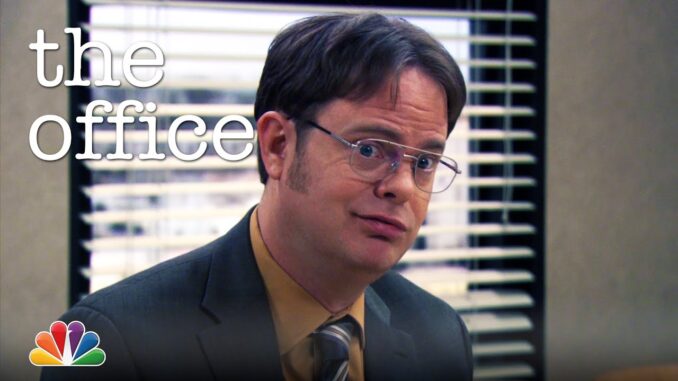
The mockumentary format of The Office thrives on the quiet absurdity of ordinary people performing for an unseen camera. It's a stage where mundane office life transforms into a series of highly personal, often awkward, and occasionally profound confessions. Every character, in their own way, responds to the omnipresent lens: Michael preens, Jim smirks, Pam confides, Angela scowls. But only one character, with unwavering and unblinking self-regard, would ever conceive of, and then genuinely execute, the act of interviewing himself: Dwight K. Schrute.
The very notion of a self-interview is a monument to a specific kind of ego and a profound lack of self-awareness. It requires a boundless belief in one’s own inherent fascination, combined with a total disregard for the conventional flow of social interaction. This is the bedrock of Dwight’s character. He lives in an echo chamber of his own ambition, where every thought is a pronouncement, every action a tactical maneuver, and every interaction an opportunity to demonstrate his superior intellect or physical prowess. Why wait for someone else to ask the penetrating questions about his beet farming techniques, his martial arts philosophy, or his intricate office protocols, when he already possesses the answers and, more importantly, the authority to elicit them?
Consider Dwight’s megalomania. From the moment we meet him, he is obsessed with power, hierarchy, and his own place at the top of an imagined, highly disciplined pyramid. He sees himself not merely as an Assistant Regional Manager (or Assistant to the Regional Manager), but as a multi-hyphenate expert: a survivalist, a paper salesman, a Schrute Farms proprietor, a volunteer sheriff's deputy, a property owner, and a sensei. Each of these roles, in his mind, demands documentation, analysis, and a platform for his wisdom to be disseminated. A self-interview isn’t just a quirky habit; it’s a logical extension of his belief that he is a subject worthy of profound study, a living testament to self-made excellence. Who better to conduct that study than the subject himself, ensuring all the "correct" questions are asked and the "proper" answers are given?
Furthermore, Dwight’s social awkwardness plays a crucial role. Unlike Michael Scott, who desperately craves an external audience and validation through laughter and applause, Dwight’s need for recognition is more insular. He believes he is already the most competent, intelligent, and prepared person in any room. The camera crew, for him, isn't just a film crew; it’s his personal biographers, here to record his inevitable ascent. He doesn’t need them to ask him questions to affirm his importance; their mere presence is affirmation enough. If they’re not asking the right questions—the ones that truly delve into the intricacies of bear attacks or the proper way to file TPS reports—then he will simply take control of the narrative himself. He lacks the social calibration to understand that conducting a self-interview is deeply strange, bordering on pathetic. To Dwight, it’s merely efficient.
Contrast this with any other character. Jim Halpert, the master of the ironic glance, would perform a self-interview only as a prank, a mocking performance designed to highlight the absurdity of the situation. Pam Beesly, grounded and empathetic, would find it pointless and embarrassing. Oscar Martinez would dissect its psychological implications with a dry, intellectual skepticism. Even Michael Scott, for all his narcissistic need for attention, would still want someone else to be the interviewer, to truly feel like a celebrity being spotlighted. His self-worth is too dependent on the external gaze. But Dwight? Dwight doesn’t need an outside perspective to affirm his brilliance; he already knows it. He just needs a method to broadcast it, and if that method involves a Q&A session with himself, so be it.
In the end, the image of Dwight Schrute, sitting alone, perhaps in the quiet of his beet farm, asking himself profound questions and answering them with unblinking earnestness, is not just a comedic goldmine. It is a perfect encapsulation of his unique character: a man so utterly convinced of his own importance, so devoid of conventional social graces, and so hungry for a spotlight, that he would create the entire show around himself, even if he's the only one performing both roles. Only Dwight would interview himself on The Office, because only Dwight possesses the singular combination of grandiosity, delusion, and peculiar self-reliance to truly believe it's a necessary and entirely logical endeavor.